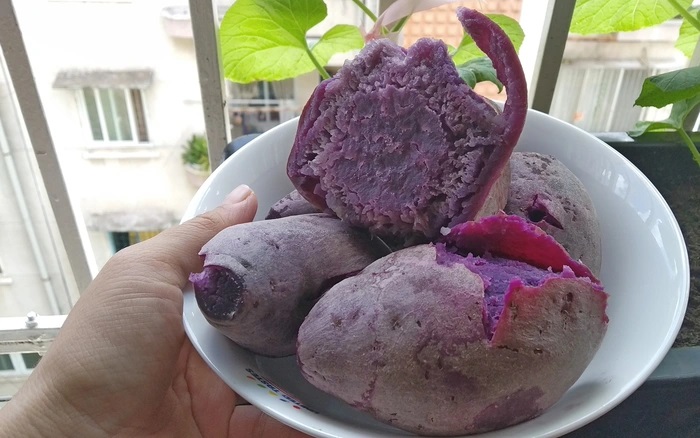Sweet potatoes, with their content of fermentable and soluble fiber, are a food that naturally helps the body regulate weight. Thus, consuming sweet potatoes leads to a higher fiber intake, aiding effective weight loss.
Hence, regularly incorporating sweet potatoes, especially purple sweet potatoes, offers numerous health benefits.

Regularly Eating Sweet Potatoes, Especially Purple Ones, Offers Multiple Health Benefits.
1. Eating Sweet Potatoes Supports Blood Sugar Control
The flavonoids in purple sweet potatoes have been shown to lower blood sugar levels in people with type 2 diabetes.
A test-tube study observed that flavonoid-rich extracts from purple sweet potatoes reduced oxidative stress and insulin resistance by protecting insulin-producing cells in the pancreas.
2. Eating Sweet Potatoes Promotes Gut Health
Purple sweet potatoes contain resistant starches that boost the growth of Bifidobacteria – healthy bacteria that play a crucial role in maintaining gut health.
These gut bacteria produce B vitamins, healthy fatty acids, and support the breakdown of complex carbs and fiber, thereby contributing to a healthy gut.
Additionally, extracts from sweet potatoes can destroy prostate cancer cells, ensuring that cancer does not spread or develop in any other part of the prostate.
The high anthocyanin content in purple sweet potatoes explains why this root vegetable is beneficial in anti-cancer activity in breast and stomach cancers.

Eating 3-4 Sweet Potato Roots Per Week Contributes to 5 Health Benefits.
3. Helps Lower Blood Pressure
Another benefit of purple sweet potatoes is their potential to lower blood pressure. Researchers attribute this to their impressive antioxidant content.
A test-tube study showed that purple sweet potatoes contain antioxidants that can help reduce blood pressure similarly to common blood pressure-lowering medications.
However, these are laboratory research findings. More human studies are necessary before concluding whether eating purple sweet potatoes can lower one’s blood pressure.
4. Improves Asthma Symptoms
Numerous studies have demonstrated that a diet rich in antioxidants like vitamins A and C is associated with a reduced risk of asthma.
A review of 40 studies found that the occurrence of asthma in adults was linked to low vitamin A levels.
5. Eating Sweet Potatoes Improves Vision
The vitamin A in purple sweet potatoes improves vision. A deficiency in vitamin A leads to poor eyesight and can even cause blindness.
Additionally, this condition is associated with eye diseases such as corneal ulcers, dry cornea, and conjunctivitis.
The vitamins A, C, and E in this root vegetable are excellent for improving vision and preventing eye problems.





































